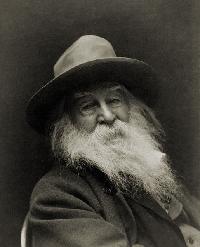Walt Whitman, one of the most famous American poets in the canon, was born in 1819. When he was 12, he started training to be a printer, which prompted him to read the works of Homer, Dante, and Shakespeare. When he was 17, he taught in a one-room schoolhouse in Long Island. He taught for five years before founding the weekly newspaper, the Long-Islander. In 1848, he took a job at the New Orleans Crescent but returned north later that year and founded a “free soil” paper, the Brooklyn Freeman. In 1855, Whitman published the opus that he would spend his life revising, Leaves of Grass. He sent a copy to Ralph Waldo Emerson--the second edition of the book featured a letter of praise from the famed poet and philosopher.
During the Civil War, Whitman worked in hospitals tending to the wounded. He worked as a clerk for the Department of the Interior but was subsequently fired when the Secretary of the Interior found out he authored the controversial Leaves of Grass. Whitman spent his last years in Camden, New Jersey working on a new edition of the book and writing his final publication, Good-Bye, My Fancy. He died in 1892 and is buried in a tomb he designed in Camden’s Harleigh Cemetery.
A Clear Midnight
This is thy hour O Soul, thy free flight into the wordless,
Away from books, away from art, the day erased, the lesson
done,
Thee fully forth emerging, silent, gazing, pondering the
themes thou lovest best,
Night, sleep, death and the stars.
Have a question for Free Library staff? Please submit it to our Ask a Librarian page and receive a response within two business days.

